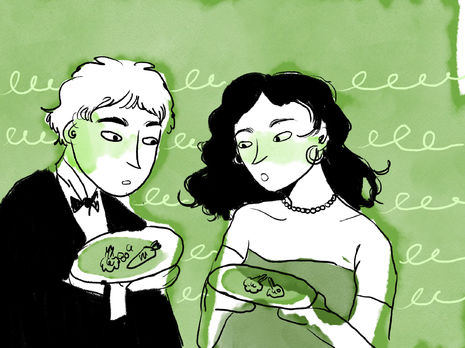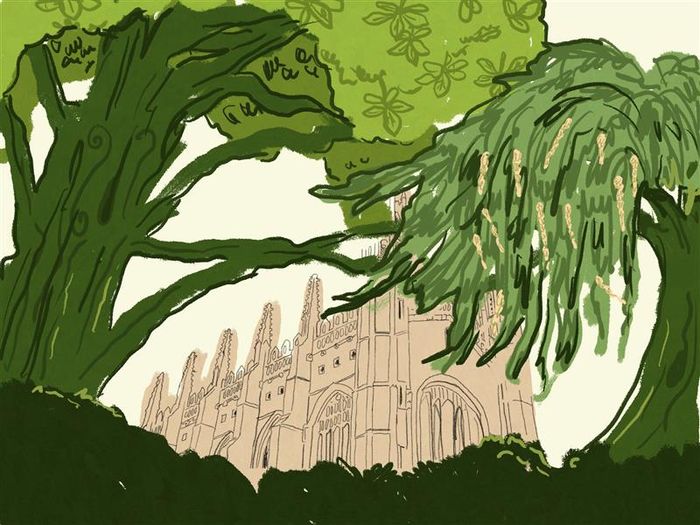Will May Balls ever be sustainable?
Isabella Bottle speaks to May Ball committee members about their efforts to go green

Characterised by consumption, Cambridge May Balls are famed for their excess, offering guests a night of unlimited drinks, food, and entertainment. While the student-led Sustain-a-Ball accreditation system “provides a comprehensive list of sustainability expectations and suggestions” for how to make these events more environmentally friendly, last year only 11 of the 31 colleges joined the scheme, and there is significant variation in the work being done by different May Ball committees to reach these goals. Members of the student committees who organise these events seem to share a genuine concern for the emissions and waste they generate, yet some feel more constrained than others by the ways in which May Balls are organised across the University.
“To support such initiatives over a five year period, Sustain-a-Ball launched their ‘long-term legacy’ programme”
In most cases, May Balls operate separately from the colleges in which they are held and rely only on the funds from ticket sales that year to cover their costs, which can preclude investment in reusable features. According to Niklas Todt, Sustainability Officer for the Pembroke May Ball this year, despite the fact that “we want to reuse as much as possible, there is often a large upfront cost for high-quality items that are meant to last, and almost always May Balls don’t have that kind of money, because we are working on a year to year cycle. Every pound that we gain from ticket sales this year will go into the ball this year – we don’t have any room to play with. So things like reusable battery packs, in large quantities, quickly add up.”
This explains why even larger Balls struggle to make longer-term investments in sustainable goods, as confirmed by Orlane Vanmarcke, President of the St John’s May Ball committee. According to Vanmarcke, investing in reusable crockery is a “big risk” due to the sheer quantity required for an event with over 3,000 guests, so they “will be purchasing 20,000 reusable cups that can be used in future years, hiring glass-washers and seeing if it works.” While Vanmarcke had hoped to use only reusable crockery in this year’s Ball, this purchase represents “a step towards improvement”, making up 50% of the plastic cups that will be used on the night, in the hopes that future committees will continue to invest in a similar way “until we reach 100% single-use-plastic free”. To support such initiatives over a five year period, Sustain-a-Ball launched their ‘long-term legacy’ programme in 2020, inviting committees to “borrow the previous work, find the shortfalls and build upon it” – the results of which will be published in 2026.
Some student organisers partially blame the segregated nature of May Balls within the University’s college system for these difficulties. For Sustain-a-Ball committee member Charlotte Boggon, “a wider cohesive target or strategy to improve their sustainability is desperately needed”, and Todt suggests that “cross-college collaboration” could help spread the cost of items such as reusable flooring, energy generators, and crockery “which could be used over the few days that the May Balls take place”. Similarly, one student organiser believes that another committee receives subsidies for sustainable investments from its college, while in their case “the Ball has become very separate from the college […] so more collaboration could help.”
“Sustainable action should be seen as a creative opportunity rather than a constraint”
In terms of college input, Todt adds that “colleges should be more proactive in providing sustainability guidelines for these events, but also more broadly with their own catering and the institutions they associate with.” Alluding to the issues raised by student climate groups over the University’s supposed ties with fossil fuel companies, co-presidents of the Darwin College May Ball, Tapasya Sahu and Joe Cowan agree that “not all colleges are equally green,” however, they argue “it all comes down to the committee, which needs to be led by those genuinely interested in making it green”.
The Darwin May Ball achieved the Platinum accreditation from Sustain-a-Ball last year, making it the “most sustainable ball in Cambridge”. This year it will once again offer vegan-only food options, which Cowan says “is the easiest way to cut down on emissions” as well as the most reliable, unlike recycling, “which we have very little control over once it is out of our hands”.
While in the case of St John’s, Vanmarcke highlighted the high environmental cost of sourcing “twenty or more vegan vendors, which for an event of our size would have to come from further away and thus use more fuel”, Cowan dismissed these sorts of justifications, questioning “whether you can honestly say you are committed to sustainability when we know that meat consumption has such a huge impact on the environment.” Sustain-a-Ball also asks attendees to be conscious of their choices around these events and organise “a formal wear clothes sharing group on Facebook” to help overcome the “Scope 3” impacts of fast-fashion purchases made to meet May Event dress codes.
The Darwin co-presidents acknowledged that reaching sustainable goals may be easier “as a smaller college and a cheaper ball”, but suggested that larger college balls could consider “downscaling their events” by replacing high-energy-consuming fairground rides with more musical events, or “making tickets cheaper to limit expectations and reduce consumption.” For the President of the Ball at St John’s, this seems unfeasible, as “keeping the tradition alive is really important,” and “the Ball would not be the same without the rides, which give people something to do once they have seen enough music in the nine hours that we are open”. However, Sustain-a-Ball argues that “sustainable action should be seen as a creative opportunity rather than a constraint”. Indeed, for Sahu, scaling down or offering a vegan-only menu “does not reduce the value of guests’ experiences – what we are offering is still high quality and our guests will enjoy themselves just as much.”
So, while college- and inter-May Ball collaboration may improve the capacity for these events to become more sustainable, the extent to which their organisers are motivated to make changes depends on their vision of what will satisfy their high-paying guests. The question therefore arises of whether these events can, or should, continue to exist in their current form, without changing their methods of delivery to reduce their environmental impact – some answers to which might be found in a re-assessment of what students and other guests truly prioritise in their experience, and whether these same expectations can be met in more sustainable ways.
 News / Hundreds of Cambridge academics demand vote on fate of vet course20 February 2026
News / Hundreds of Cambridge academics demand vote on fate of vet course20 February 2026 News / Judge Business School advisor resigns over Epstein and Andrew links18 February 2026
News / Judge Business School advisor resigns over Epstein and Andrew links18 February 2026 News / Petition demands University reverse decision on vegan menu20 February 2026
News / Petition demands University reverse decision on vegan menu20 February 2026 News / University Council rescinds University Centre membership20 February 2026
News / University Council rescinds University Centre membership20 February 2026 News / CUCA members attend Reform rally in London20 February 2026
News / CUCA members attend Reform rally in London20 February 2026










